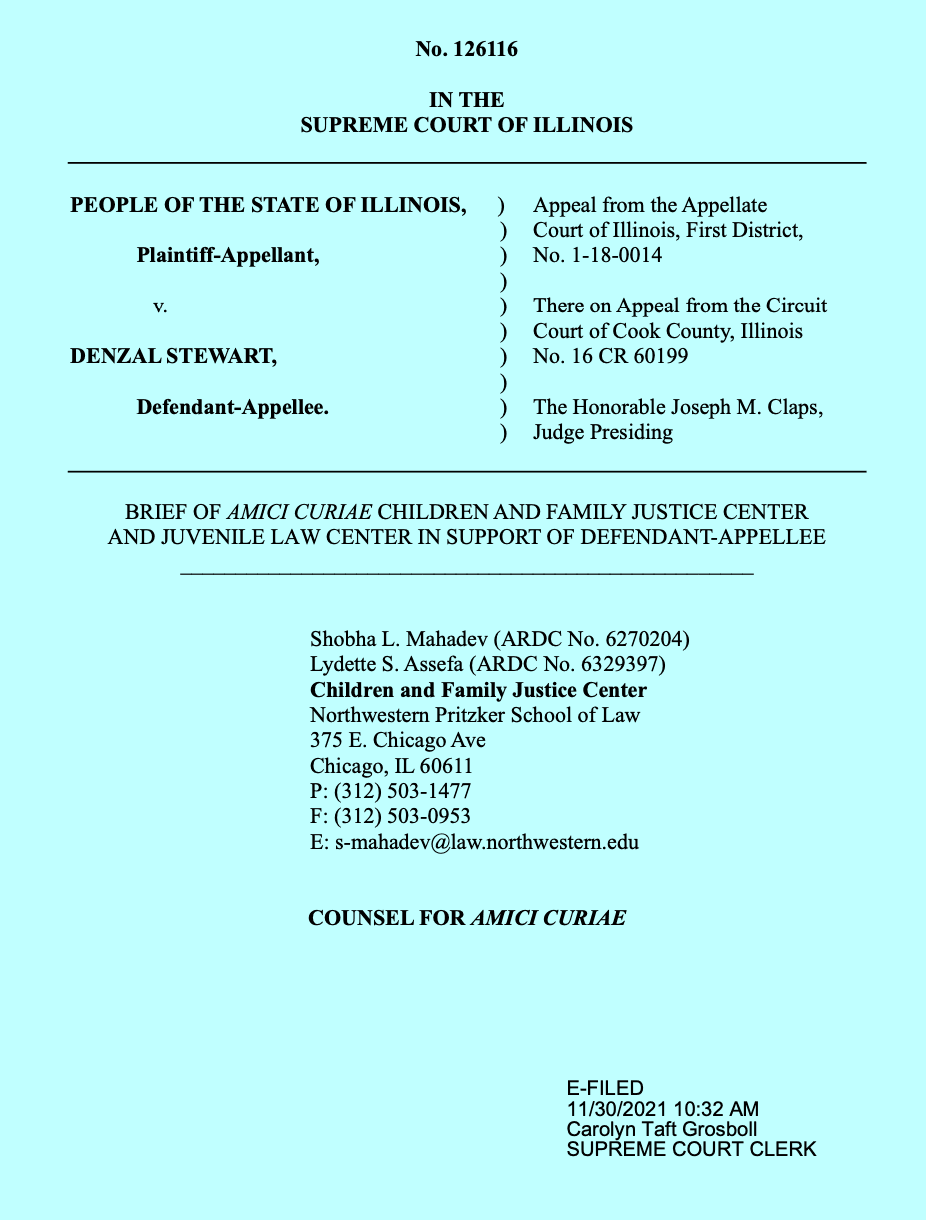
Summary of Argument
Prior to July 2021, offenses committed by youth under age 18 were included in eligibility for Class X Sentencing. 730 ILCS 5/5-4.5-95(b) (West 2019). The Illinois General Assembly has recently amended this statute to exclude offenses committed by any person under age 21. 730 ILCS 5/5-4.5-95(b) (West 2021). However, the prior statutory scheme, under which Denzal Stewart was convicted, contradicts the United States Supreme Court’s and Illinois’ well-established recognition of the constitutional difference between children and adults by allowing two predicate offenses to serve as the basis for eligibility under Class X adult mandatory sentencing when those offenses occurred when the individual was a child. Juvenile Law Center joins the Office of the State Appellate Defender and the Children and Family Justice Center in asking this Court to exclude offenses committed before age 18 from Class X Offender eligibility.
Eliminating youthful offenses from Class X sentencing eligibility would also address the disproportionate effects that those sentencing schemes have on Black and Brown youth in Illinois through the disparate rates that Black and Brown children are transferred to adult court. Studies have shown that “automatic transfer[s] disproportionately affect[] children of color.” Juvenile Justice Initiative, Automatic Adult Prosecution of Children in Cook County, Illinois, 2010-2012 11 (2014). Indeed, prior to the 2014 amendment of the Juvenile Justice Act, Black and Brown youth were disproportionately excluded from juvenile court jurisdiction. Id. This disproportionality is consistent with national data. At every stage of the criminal justice system, from interrogation through arrest, prosecution and plea negotiation, trial, and sentencing, people of color—particularly Black males—are treated more harshly than white individuals. See, e.g., Marc Mauer, Addressing Racial Disparities in Incarceration, 91 Prison J. 87S, 91S-95S (2011). Black children are more likely to be prosecuted as adults and incarcerated with adults. Nationally, Black youth comprise 14% of the general population, but 47.3% of the youth transferred to adult court by juvenile court judges. Jeree Michele Thomas & Mel Wilson, Nat’l Ass’n of Social Workers, The Color of Juvenile Transfer: Policy & Practice Recommendations 1 (2017). The greater number of Blackyouth tried in the adult criminal justice system results in the systematic, long-term incarceration of thousands of Black youth. Given that Black and Brown youth enter the adult criminal justice system at a rate higher than their peers, the former Class X Offender Statute, which automatically imposed adult punishments on individuals convicted of youthful offenses, contributes to this racial disparity. In fact, a 2020 report studying data from 2017 found that Black and Brown youth continue to be transferred to the adult court at disproportionate rates.
These disparities are a result of policies and practices, implicit biases, and the structural disadvantage of communities of color. See, e.g., John R. Mills, Anna M. Dorn & Amelia Courtney Hritz, Juvenile Life Without Parole in Law and Practice: Chronicling the Rapid Change Underway, 65 Am. U. L. Rev. 535, 584–85 (2016) (“racially biased political appeals played an important role in creating the climate that led to the enactment of . . . legislation” that increased the criminalization of Black youth (quoting Sara Sun Beale, You’ve Come a Long Way, Baby: Two Waves of Juvenile Justice Reforms from Jena, Louisiana, 44 Hav. C.R.-C.L. L. Rev. 511, 514 (2009))); The Sent’g Project, Report of the Sentencing Project to the United Nations Human Rights Committee: Regarding Racial Disparities in the United States Criminal Justice System 3-6 (2013) (citing Sandra Graham & Brian S. Lowery, Priming Unconscious Racial Stereotypes About Adolescent Offenders, 28 Law & Hum. Behav. 483, 485 (2004)); Lauren Krivo & Ruth Peterson, Extremely Disadvantaged Neighborhoods and Urban Crime, 75 Soc. F. 619, 642 (1996) (discussing arrest rates); Michael Siegel et al., The Relationship between Racial Residential Segregation and Black-White Disparities in Fatal Police Shootings at the City Level, 2013-2017, 111 J. Nat’l Med. Ass’n 580, 585–86 (2019) (discussing effect of neighborhood segregation on racial disparities in police shootings); Kristin Henning, The Reasonable Black Child: Race, Adolescence, and the Fourth Amendment, 67 Am. U. L. Rev. 1513, 1554–56 (2018) (citing Ronald Weitzer & Rod K. Brunson, Strategic Responses to the Police among Inner-City Youth, 50 Socio. Q. 235, 235–36 (2009)) (Black youth experience extensive surveillance and harmful police encounters, including constant police presence and frequent pedestrian or vehicle stops); Patricia Foxen, Perspectives from the Latino Community on Policing and Body Worn Cameras, Medium (May 4, 2017) (documenting reactions to the hyper-policing of Latino communities).
In a press release issued on June 22, 2020, the Illinois Supreme Court recognized the disproportionate impact that the application of certain laws, rules, policies, and practices had and continue to have on Black and Brown people in Illinois and nationally. See Supreme Court Releases Statement of Racial Justice, Next Steps for Judicial Branch, Supreme Court of Illinois (June 22, 2020). The Court noted “[r]acism exists, whether it be actualized as individual racism, institutional racism or structural racism, and it undermines our democracy, the fair and equitable administration of justice, and severely diminishes individual constitutional protections and safeguards” of citizenship, rights, and the sacred benefits of all. Id. Black and Brown people should not have a diminished expectation of fairness, equity, and freedom from racial discrimination, yet they “are continually confronted with racial injustices that the Courts have the ability to nullify and set right.” Id. The Illinois Supreme Court reiterated that: “Where frailties in the disposition of justice exist, we will recognize and acknowledge them and seek to rectify any injustice.” Id. This Court can put action to its words by ensuring that the application of Illinois laws does not continue to be disproportionately levied against Black and Brown children.
For the foregoing reasons, we urge this Court to affirm the Appellate Court’s decision and conclude that prior offenses committed when Defendant was 17 years old can no longer satisfy a conviction under the Class X Sentencing Scheme.